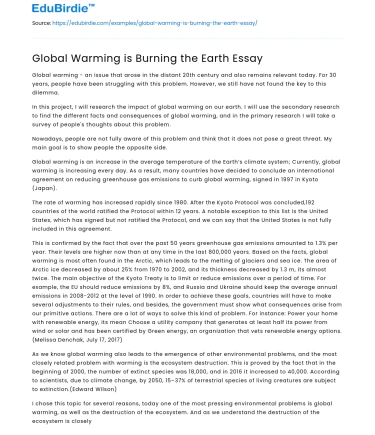Global warming - an issue that arose in the distant 20th century and also remains relevant today. For 30 years, people have been struggling with this problem. However, we still have not found the key to this dilemma.
In this project, I will research the impact of global warming on our earth. I will use the secondary research to find the different facts and consequences of global warming, and in the primary research I will take a survey of people's thoughts about this problem.
Nowadays, people are not fully aware of this problem and think that it does not pose a great threat. My main goal is to show people the opposite side.
Global warming is an increase in the average temperature of the Earth’s climate system; Currently, global warming is increasing every day. As a result, many countries have decided to conclude an international agreement on reducing greenhouse gas emissions to curb global warming, signed in 1997 in Kyoto (Japan).
The rate of warming has increased rapidly since 1980. After the Kyoto Protocol was concluded,192 countries of the world ratified the Protocol within 12 years. A notable exception to this list is the United States, which has signed but not ratified the Protocol, and we can say that the United States is not fully included in this agreement.
This is confirmed by the fact that over the past 50 years greenhouse gas emissions amounted to 1.3% per year. Their levels are higher now than at any time in the last 800,000 years. Based on the facts, global warming is most often found in the Arctic, which leads to the melting of glaciers and sea ice. The area of Arctic ice decreased by about 25% from 1970 to 2002, and its thickness decreased by 1.3 m, its almost twice. The main objective of the Kyoto Treaty is to limit or reduce emissions over a period of time. For example, the EU should reduce emissions by 8%, and Russia and Ukraine should keep the average annual emissions in 2008-2012 at the level of 1990. In order to achieve these goals, countries will have to make several adjustments to their rules, and besides, the government must show what consequences arise from our primitive actions. There are a lot of ways to solve this kind of problem. For instance: Power your home with renewable energy, its mean Choose a utility company that generates at least half its power from wind or solar and has been certified by Green energy, an organization that vets renewable energy options. (Melissa Denchak, July 17, 2017)
As we know global warming also leads to the emergence of other environmental problems, and the most closely related problem with warming is the ecosystem destruction. This is proved by the fact that in the beginning of 2000, the number of extinct species was 18,000, and in 2016 it increased to 40,000. According to scientists, due to climate change, by 2050, 15–37% of terrestrial species of living creatures are subject to extinction.(Edward Wilson)
I chose this topic for several reasons, today one of the most pressing environmental problems is global warming, as well as the destruction of the ecosystem. And as we understand the destruction of the ecosystem is closely connected with a rapidly warming, and if we try to fix it, we will secure a good future.
In my research, I will use secondary and primary sources for fully solve the problem of my project, as well as the primary resource this includes qualitative and quantitative research.
In secondary resources will be taken from various sites, books and videos. Such information is needed to show the opinion of famous people about the problem that is discussed in your project. In addition, thanks to such resources, I will be able to compare the level of gas emissions in different countries and draw a conclusion in which country this problem is more relevant and due to this I can make my project more qualitative.
In the form of quantitative research, I will choose the survey. The survey included different types of questions: dichotomous, ordinal, filter and open questions. I will take a survey of 10 people who are very well versed in my topic. Due to this survey you will be able to make the right conclusion about your project and also find out how many people consider global warming an acute problem or not, more precisely, you can use it to make statistics about the people around you.
Thanks to qualitative research, I will be able to go deeper and learn much more about my problem in the project as I will interview a person who is very well versed in this subject. Most likely I will interview teachers of geography and biology as their subject is very closely connected with the problem of warming in the world. Also, they will show where my mistakes in the study and give any advice about this.
All these resources I use in order to fully achieve all my goals that I set earlier on this project and I think that all the resources that I used will be able to open my entire project.






 Stuck on your essay?
Stuck on your essay?

